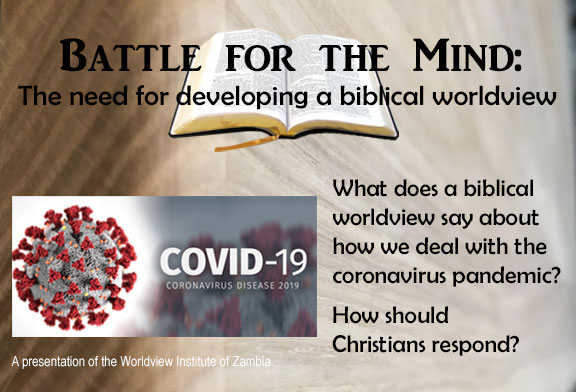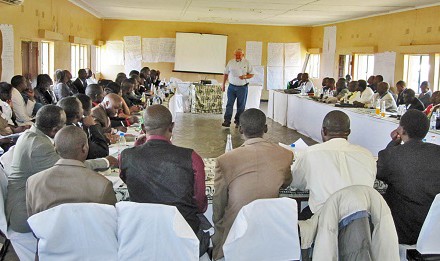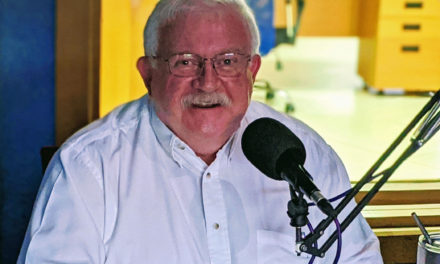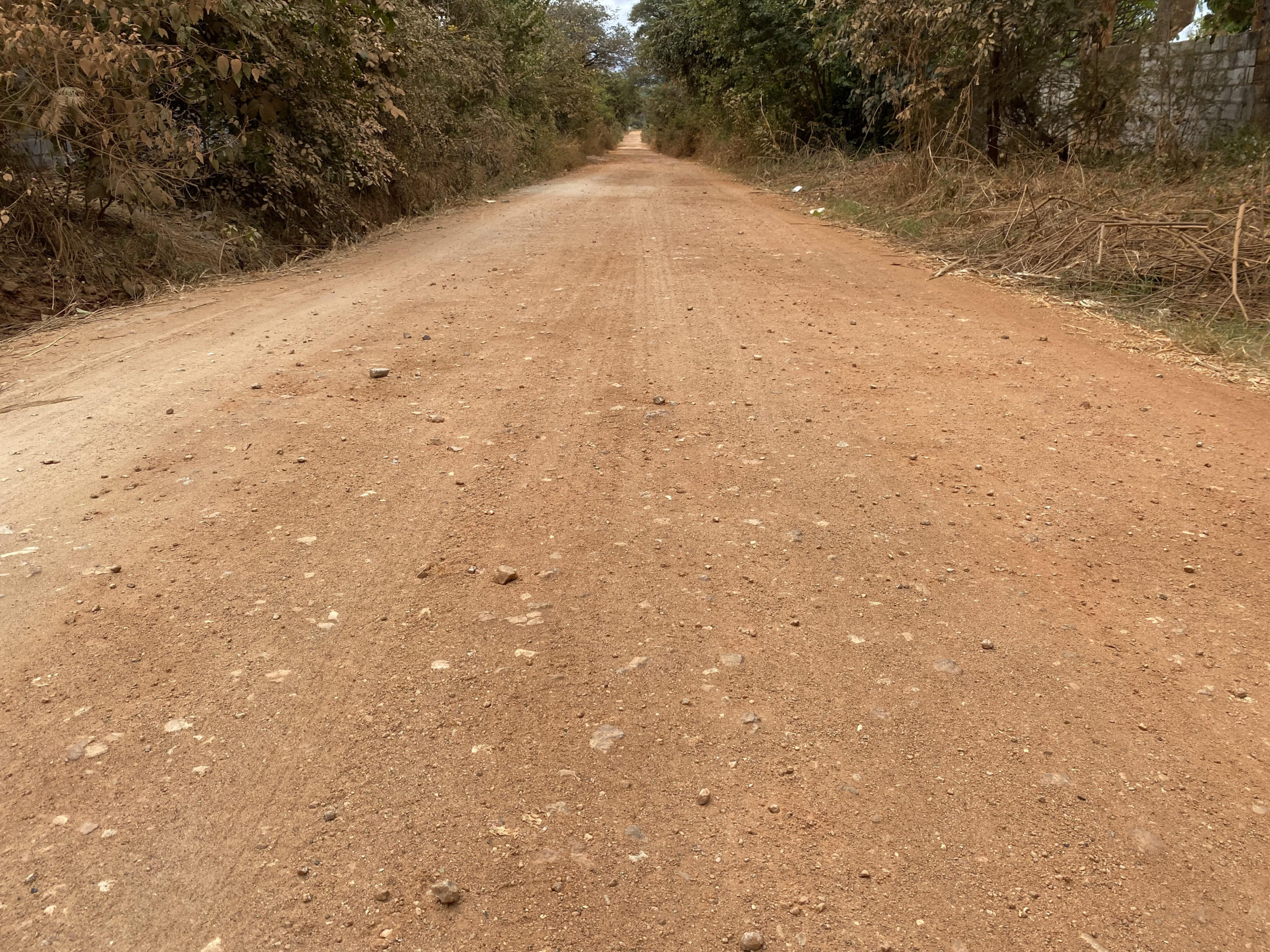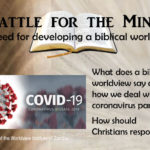How should Christians respond to this crisis of the Coronavirus Pandemic?
(This is the script for the radio program, Battle for the Mind: The need for developing a biblical worldview, that was broadcasted Sunday, March 22, 2020, on Radio Christian Voice, the largest Christian radio station in Zambia.)
Kunda: Coronavirus! Coronavirus! The world seems to be in major upheaval over the Coronavirus. How does having a biblical worldview affect how Christians deal with a major health crisis such as this?
David: I don’t think many of us have seen anything like this in our lifetimes.
How is the world responding to this quickly spreading virus? What do we see and hear daily in the media as to what people are doing?
Fear. Fear is evident around the world. Fear that is based on what? It’s the kind of fear that is based on the fear of darkness, of sounds not associated with sources we know; of strange smelling foods; of people who look and act very different than ourselves; of anything that is not familiar.
Fear. Where did this virus come from? How is it spreading? Why is there no vaccine? Now that it is in Zambia, what will happen? Will it kill me? Will it hurt me for life? What will happen to me when I get sick with it? Who will help me?
Our focus in this program on the need for developing a biblical worldview is more relevant to this issue than you might expect. How a person perceives the realities around him or her selves, is based completely on what a person has made the source of their total allegiance for living, their worldview.
Remember, folks, thinking and behavior are based on worldviews. What we are witnessing today reflects the worldviews held by good men and women who are now being confronted by an unknown new calamity. Worldviews help us to understand, explain and place into known categories new things that come into our lives.
And situations like this can tell us a great deal about the worldviews people have.
How a Christian responds today, tells the people around them if Christianity is any different than other philosophies or religions that we find. Sadly, many Christians show evidence they are guided by worldviews developed in the world that is separated from God and determined by sin. Many Christians are showing fear and even a little panic.
We believe that a biblical worldview is a comprehensive explanation of reality that is rooted in the Word of God, the Bible.
God does have words that help us to deal with the events of this world.
Our faith as Christians is not just focused on personal devotion and reverence to our religious belief in God.
Our faith is comprehensive because it is focused on the One who is the Word:
In the beginning the Word already existed. The word was with God, and the Word was God. He existed in the beginning with God. God created everything through him, and nothing was created except through him. The Word gave life to everything that was created, and his life brought light to everyone. The light shines in the darkness, and the darkness can never extinguish it. John 1:1-5
Jesus upholds all creation:
The Son radiates God’s own glory and expresses the very character of God, and he sustains everything by the mighty power of his command. When he had cleansed us from our sins, he sat down in the place of honor at the right hand of the majestic God in heaven.
And:
He existed before anything else, and he holds all creation together. Christ is also the head of the church which is his body. Col. 1:17-18
To all of you who are listening this morning, GOD IS STILL ON THE THRONE!! GOD IS STILL GOD!!
Let me ask you, is anything outside of the understanding of God? Of Jesus? Anything? Diseases?
Nothing, I repeat, nothing is outside of his creation of which he holds ALL together.
A biblical worldview knows that nothing passes by God. He doesn’t miss anything. He understands it all. And He upholds it all together. God is God and he is a good God.
Why does God allow suffering and calamities?
Kunda: The question a lot of people have is why God allows these bad things that can harm us? People in general and Christians specifically.
David: And there are other related questions:
If God loves his creation so much, why doesn’t he just intervene and prevent so many of the great crises that humanity has faced and will face?
If healing is a spiritual gift given to the Church, why doesn’t God heal everyone?
And a biblical worldview looks to the Bible for answers to these and the other related questions we have. From the Bible, we understand that God created all and had a perfect plan for all. What he made he said was good. It was never part of God’s intention that the problems we see existing in the world today would be there. Even in the final book, Revelations, we read
Then I saw a new heaven and a new earth, for the old heaven and the old earth had disappeared….He will wipe every tear from their eyes, and there will be no more death or sorrow or crying or pain. All these things are gone for ever. Rev. 21:1,4.
So,what we are experiencing now in the world was not his plan. God did not design sickness and disease and plan for them to trouble his creation. He did not plan for calamities to strike our lives. However, it is quite obvious to anyone alive that we face bad things in life.
The Bible tells us clearly that the source of these problems is Sin. Adam was able to make choices and he chose poorly, to disobey God and bring a break between the Creator and the Creation. God then cursed Adam and his progeny and that curse fell upon the physical creation, too.
And to the man he said, “Since you listen to your wife and ate from the tree whose fruit I commanded you not to eat, the ground is cursed because of you. All your life you will struggle to scratch a living from it. It will grow thorns and thistles for you, thought you will eat of its grains.” Gen. 3:17-18
Folks, God created good and Man spoiled it through disobedience. Today creation suffers from the resulting curse.
Against its will, all creation was subjected to God’s curse. Rom 8:20
For we know that all creation has been groaning as in the pains of childbirth right up to the present time. Rom 8:22
However, somewhere along in our existence, we have developed the idea that we have a right not to have suffering in our lives. We don’t deserve to suffer. Some of the teachings that are found in Churches today in Zambia emphasize that as God’s people, we are not to experience suffering, that we are above that in Christ as the children of God. We are told we have a right to prosper and not suffer, to be healed and not be sick.
Where could this emphasis on our rights come from?
The Fall, when humanity chose to place itself on the throne, or in our worldview terminology, at the core of our existence. When our self became the focus of our ultimate allegiance.
The Kingdom of God has come, yet not in its fullness.
Kunda: Are you saying that suffering is part of life? It is just something that we can expect to experience?
David: It was not part of creation. Suffering is a result of the Fall and sin. Jesus came to reverse the curse of the Fall and initiate the kingdom of God to be again on earth. For the time being, yes, the curse remains.
Jesus came proclaiming the kingdom of God has come. It has come, it has begun, but not in its fullness. When it does, when Jesus returns to restore all of creation to the kingdom, suffering will end, but not until then.
At this time, we have the gift from the Father, the Holy Spirit, as an earnest payment, a down payment of the perfect bodies we will have in heaven.
While we live in these earthly bodies, we groan and sigh, but it’s not that we want to die and get rid of these bodies that clothe us. Rather, we want to put on our new bodies so that these dying bodies will be swallowed up by life. God himself has prepared us for this, and as a guarantee he has given us his Holy Spirit. So we are always confident, even though we know that as long as we live in these bodies we are not at home with the Lord. For we live by believing and not be seeing. 2 Cor 5:4-8
God expects that we understand that for now, in these bodies, things are not perfect. He has given us the Holy Spirit to make things better, but they are not yet perfect. The Holy Spirit’s presence is a foretaste, a guarantee of the perfection of life with God in heaven will be like. Therefore, with this knowledge, we should not live in fear of the troubles on earth. Though we may experience some, diseases such as coronavirus are not the end of our lives.
Christian reponses to earlier plagues have changed history.
Kunda: Once we understand that as Christians our response to something like the coronavirus is not to be fear, what should our response be?
David: The church has had to face severe plagues from early in its history. During the third century, a great plague, the Antonine plague, struck the Roman Empire and lands beyond its boundaries. Death was everywhere. It was one of the greatest recorded pandemics until then. At the peak of the outbreak, about 5,000 people were dying every day in the city of Rome, alone!!! Over 2/3s of the city died.
What about the Christians?
There is a journal in the United States, it is a very secular journal, and it has published on 13 March, an article that talks about the historical response of the Church/Christians to pandemics. I want to read a section from that article.
The Christian response to plagues begins with some of Jesus’s most famous teachings: “Do unto others as you would have them do unto you”; “Love your neighbor as yourself”; “Greater love has no man than this, that he should lay down his life for his friends.” Put plainly, the Christian ethic in a time of plague considers that our own life must always be regarded as less important than that of our neighbor.
During plague periods in the Roman Empire, Christians made a name for themselves. Historians have suggested that the terrible Antonine Plague of the 2nd century, which might have killed off a quarter of the Roman Empire, led to the spread of Christianity, as Christians cared for the sick and offered a spiritual model whereby plagues were not the work of angry and capricious deities but the product of a broken Creation in revolt against a loving God.
But the more famous epidemic is the Plague of Cyprian, named for a bishop who gave a colorful account of this disease in his sermons. Probably a disease related to Ebola, the Plague of Cyprian helped set off the Crisis of the Third Century in the Roman world. But it did something else, too: It triggered the explosive growth of Christianity. Cyprian’s sermons told Christians not to grieve for plague victims (who live in heaven), but to redouble efforts to care for the living. His fellow bishop Dionysius described how Christians, “Heedless of danger … took charge of the sick, attending to their every need.”
Nor was it just Christians who noted this reaction of Christians to the plague. A century later, the actively pagan Emperor Julian would complain bitterly of how “the Galileans” would care for even non-Christian sick people, while the church historian Pontianus recounts how Christians ensured that “good was done to all men, not merely to the household of faith.” The sociologist and religious demographer Rodney Stark claims that death rates in cities with Christian communities may have been just half that of other cities.
(https://foreignpolicy.com/2020/03/13/christianity-epidemics-2000-years-should-i-still-go-to-church-coronavirus/)
Emperor Julian was embarrassed of how the Christians completely out-shown his fellow non-Christian Helenists. Stark went on to write,
“for all that [Julian] urged pagan priests to match these Christian practices, there was little or no response because there were no doctrinal bases or traditional practices for them to build upon.”
(https://www.thegospelcoalition.org/article/what-early-church-teach-coronavirus/)
The biblicala worldview makes a difference in dealing with life.
Kunda: So, plagues and mass outbreaks of disease are not a new thing in history. And it looks like Christians have helped a great deal in dealing with them.
David: Yes, because it has the doctrinal bases and traditional practices from which to build a response.
The biblical worldview provides the foundation for our Christian response to all troubles and even this coronavirus that is knocking on the doors of our nation.
Jesus taught us:
You have heard the law that says, ‘Love your neighbour’ and hate your enemy. But I say, love your enemies! Pray for those who persecute you! In that way you will be acting as true children of your Father in heaven. For he gives his sunlight to both the evil and the good, and he sends rain on the just and the unjust alike. If you love only those who love you, what reward is there for that? Even corrupt tax collectors do that much. I you are kind only to your friends, how are you different from anyone else? Even pagans do that. But you are to be perfect, even as your Father in heaven is perfect. Mt 5:43-48
And:
Do to others whatever you would like them to do to you. This is the essence of all that is taught in the law and the prophets. Mt. 7:12
And:
This is my commandment: love each other in the same way I have loved you. There is no greater love than to lay down one’s life for one’s friends. Jn 15:12-13
The worldview foundations of the people of the world is a focus on self leading to actions of self-preservation over all else. You can see the pictures and hear the reports of hoarding taking place in many countries. Take care of me is the first thing.
The Christian response must be different, reflecting the God we believe in, the new life we have in Christ Jesus, and the presence of the Holy Spirit in us.
We should have no fear that overcomes our right thinking and our faith. The peace of Christ should rule in our hearts.
Based upon our faith, we should act.
Kunda: What should we do?
David: We should obey the guidelines put forth to us by our government and health officials.
Then we should look to see the opportunities we have to serve those in need around us.
Suppose you see a brother or sister who has no food or clothing, and you say, “Good-bye and have a good day; stay warm and eat well”—but then you don’t give that person any food or clothing. What good does that do?
So you see, faith by itself isn’t enough. Unless it produces good deeds, it is dead and useless.
Now someone may argue, “Some people have faith; others have good deeds.” But I say, “How can you show me your faith if you don’t have good deeds? I will show you my faith by my good deeds.” James 2:15-18
Even if we do not have much in things to share, we can share our help.
And I have been a constant example of how you can help those in need by working hard. You should remember the words of the Lord Jesus: ‘It is more blessed to give than to receive.’ Acts 20:35
At this point, the coronavirus has not hit our nation the ways it has hit so many others. We are relatively calm here. But for how long, we are not really sure. This is a virus, and virus know of no boundaries. They go until they stop.
Our response as Christians needs to be prepared even now as we look ahead.
How is the state of our faith?
Are we practicing good sanitation in our homes? Teaching our children?
Is the Church giving information to its communities on how to be prepared? The steps we can take as individuals, families, and communities? Are we learning and telling others about the precautions we can take to avoid spreading this or any other virus that comes our way?
Churches must be aggressive in teaching good sanitation for the home and community.
Churches need to promote loving each other, but be aggressive about social distancing, keeping a healthy distance from one another when the virus is present.
Check on those you know have weaknesses or may be in poor health. Make note of the elderly around you who may not have family nearby. They are there. Check on them.
Does this put you at risk? Perhaps. But when you practice the primary personal sanitation routines, you are doing what you can to avoid the major routes of infection.
Kunda: Again, time is reaching an end. Any closing words?
David: We’ll be watching the developments in the week to come and if we need to address this issue more, we will. Until next week,
Guard your heart above all else, for it determines the course of your life. Pro. 4:3
All Scripture references are from The New Living Translation.

